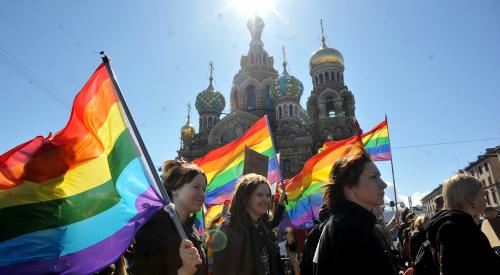- About
- Topics
- Story
- In-Depth
- Picks
- Opinion
- News
- Donate
- Signup for our newsletterOur Editors' Best Picks.Send
Read, Debate: Engage.
| topic: | Xenophobia |
|---|---|
| located: | Russia |
| editor: | Andrew Getto |
For decades, non-white ethnicities have faced open hostility and discrimination in Russia. One of the most common examples are rent ads, a good part of which explicitly state that the owners will only consider “slavic” tenants. In a rare move for a country where xenophobia is the law of the land, private companies and communities are battling this racist custom.
It started with Flats for Friends, a huge Facebook community that brings together landlords and renters. At the end of November, the page’s creator, Marfa Nekrasova, made it obligatory to include the words “the apartment is pet-friendly, occupants of all nationalities, backgrounds, genders, ages and love preferences are welcome.” Those who don’t like the addendum have the option to pay 500 rubles ($6.7) for a custom post.
CIAN, the largest commercial aggregator of real estate ads, followed suit a couple of weeks later and banned “direct and indirect discrimination, as well as oppression of a person… based on race or ethnic identity.” For readers outside of Russia, the fact that such posts even existed before might sound barbaric, but some context of the racial politics in Russia might help explain.
After the crash of the USSR, the illusion of the friendship of the peoples crashed as well. The periphery of the Soviet empire was plunged in armed conflict and poverty, and millions rushed to the former metropolis for a better living - mostly to Moscow. The saying “a person of Caucasian nationality” was born, denoting people from the Caucasus mountains whose appearances are different from the average European. The phrase has a strongly negative connotation with rising ethnic criminality, and ignores that the Caucasus is home to dozens of nationalities.
Due to low wages and the need to send home as much money as possible, migrants from the Caucasus and Central Asia often rent a small space for many people. Cases where instead of one tenant, a couple dozen actually occupy the space are widely reported. Many landlords are too scared by the possibility of damages to their property to realise that equating some bad cases with whole nations is illogical and immoral.
Yet, the discrimination is still massive. Prior to the pandemic, there were 1.6 million immigrants (mostly from Tajikistan, Uzbekistan and Kyrgyzstan) in Moscow only by official figures, plus hundreds of thousands of people from Muslim-majority Russian provinces, such as Chechnya and Dagestan, and former Soviet republics like Azerbaijan and Armenia. A staggering 17 percent of apartment listings in Moscow and St. Petersburg still single out these groups.
Therefore, it’s not surprising that the anti-xenophobic steps were met negatively by xenophobes on social media, where you can find hundreds of textbook examples of “I’m not racist, but…” phrases. No one wants to be called a bigot, but few people want to stop acting like one. The topic is very sensitive: comedian Idrak Mirzalizade was even kicked out of Russia for daring to joke about it.
The Russian authorities are getting progressively more xenophobic. This week, the head of the Human Rights Council urged the authorities to “deal” with signs in the Tajik and Uzbek languages at two subway stations, which trigger “particular irritation” from local residents, suggesting that xenophobia is a human right now.
The hostility provokes backlash even from inside the regime. This fall, a huge scandal broke out when the head of RT, Margarita Simonyan, (an ethnic Armenian herself) wrote that “the persons of Caucasian nationality… will have it coming” following a widely-covered street fight involving people from the Caucasus. She got an outraged response from none other than the head of Chechnya, Ramzan Kadyrov. “Why don’t you call out the natives of other regions?... A person of Slavic ethnicity… Does it feel nice?”
Foro me, the important thing about the anti-xenophobic campaign is that it’s a grassroots one - communities and private companies risk going against the popular opinion and stand for bigger values. The government needs to follow the trend, instead of supporting bigots.
Photo by leleblad

